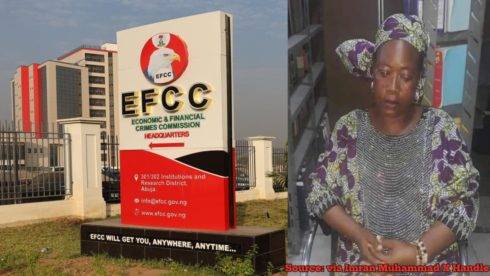The Lagos Zonal Command of the Economic and Financial Crimes Commission (EFCC) has successfully secured the conviction of Bose Lateef for money racketeering. Lateef was arraigned before Justice Deinde Dipeolu of the Federal High Court in Ikoyi, Lagos, on a charge stemming from her involvement in Naira racketeering, a violation under Section 21(4) of the CBN Act. Her arrest and subsequent conviction mark a significant victory in the ongoing efforts to combat financial crimes in Lagos.
Lateef’s case highlights the EFCC’s commitment to enforcing financial regulations and holding individuals accountable for engaging in illicit financial activities. The swift action taken by the EFCC underscores the agency’s determination to maintain the integrity of Nigeria’s financial system and deter others from similar unlawful practices.
EFCC and Bose Lateef: Arrest and Confession
Bose Lateef was apprehended by EFCC operatives on February 15, 2024, while hawking Naira notes at Eko Club, Surulere, Lagos. The arrest followed credible intelligence received by the Commission, indicating her involvement in money racketeering. At the time of her apprehension, a significant sum of Naira notes amounting to N507,500 was seized from her possession. During interrogation, Lateef admitted to her involvement in money racketeering and confessed to engaging in the illicit trade of Naira notes.
The admission of guilt by Lateef during the interrogation process served as a crucial piece of evidence in the subsequent legal proceedings. Her cooperation with law enforcement authorities provided valuable insights into the operation of illicit financial activities within the region and facilitated the prosecution’s case against her.
EFCC: Legal Proceedings and Plea
Following her arrest, Lateef was promptly arraigned before Justice Dipeolu, where she pleaded guilty to the charge of Naira racketeering. During the court proceedings, the EFCC presented compelling evidence, including Lateef’s confession and the recovered sum of Naira notes, to substantiate the charges against her. Despite attempts by her defense counsel to mitigate her sentence by citing mitigating factors such as her status as a first-time offender and her purported intent to repay a loan, the court ruled in favor of the prosecution.
Lateef’s plea of guilty and the overwhelming evidence presented by the EFCC left little room for doubt regarding her involvement in money racketeering. The court’s decision to convict and sentence her underscores the gravity of the offense and sends a strong message regarding the consequences of engaging in financial crimes.
EFCC: Prosecution’s Case and Evidence
The EFCC, represented by counsel A.S. Wara, meticulously presented its case against Lateef, highlighting the circumstances surrounding her arrest and the recovery of the illicit proceeds. Testimony from EFCC operative Olagunjo Abdulmalik provided further insight into Lateef’s illicit activities, confirming her role in the unlawful trade of Naira notes. The admission of Lateef’s statements and the recovered sum of Naira notes as exhibits bolstered the prosecution’s case, leaving little room for doubt regarding her culpability.
The prosecution’s thorough presentation of evidence and testimony effectively established Lateef’s guilt beyond a reasonable doubt, laying the groundwork for her subsequent conviction by the court. The EFCC’s diligent investigation and prosecution efforts reflect the agency’s unwavering commitment to combating financial crimes and upholding the rule of law.
Defense and Sentencing
Despite efforts by Lateef’s defense counsel to mitigate her sentence, the court ultimately handed down a one-month prison term, commencing from the day of her arrest. Additionally, the court ordered the return of the confiscated sum of Naira notes to Lateef. The defense’s plea for leniency based on mitigating factors such as Lateef’s purported intention to repay a loan from a cooperative society did not sway the court’s decision.
The sentencing of Lateef serves as a deterrent to others contemplating engaging in similar illicit financial activities. By holding Lateef accountable for her actions, the court reaffirmed its commitment to upholding the integrity of Nigeria’s financial system and deterring individuals from undermining its stability through unlawful means.
EFCC’s Conviction of Bose Lateef: A Landmark Victory Against Financial Crimes in Nigeria
The recent conviction and sentencing of Bose Lateef mark a pivotal triumph in Nigeria’s relentless campaign against financial malfeasance. Through the diligent efforts of the Economic and Financial Crimes Commission (EFCC), Lateef’s prosecution exemplifies the nation’s unwavering commitment to upholding financial regulations and ensuring accountability within its financial sector. This landmark legal outcome not only showcases the EFCC’s formidable resolve but also signals a clear warning to potential wrongdoers who dare to exploit Nigeria’s financial system for illicit gains.
As Nigeria continues to fortify its regulatory framework and enhance enforcement mechanisms, cases such as Bose Lateef’s underscore the severe repercussions awaiting perpetrators of financial crimes. The EFCC’s successful prosecution not only delivers justice for victims but also serves as a crucial deterrent against future misconduct. By relentlessly pursuing individuals like Lateef, Nigeria reaffirms its stance against corruption and reaffirms its dedication to fostering a transparent and trustworthy financial environment for its citizens and investors alike.
Table of Contents
Discover more from OGM News NG
Subscribe to get the latest posts sent to your email.














